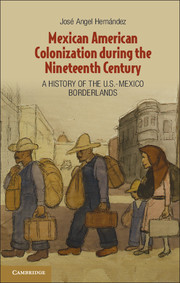 Mexican American Colonization during the Nineteenth Century
Mexican American Colonization during the Nineteenth Century Book contents
- Frontmatter
- Contents
- Figures
- Acknowledgments
- Introduction
- Part I Migration to Mexico in an Age of Global Immigrations
- Chapter One From Conquest to Colonization
- Chapter Two Postwar Expulsions and Early Repatriation Policy
- Part II México Perdido and the Making of Postwar Repatriation Programs Along the Borderlands
- Chapter Three Postwar Repatriation and Settling the Frontiers of New Mexico
- Chapter Four Repatriations Along the International Boundary
- Part III The Local Mixing, Unmixing, and Remixing of a Repatriate Colony in Chihuahua
- Chapter Five The 1871 Riot of La Mesilla, New Mexico
- Chapter Six Colonizing La Ascensión, Chihuahua
- Chapter Seven Anatomy of The 1892 Revolt of La Ascensión, or the Public Lynching of Rafael Ancheta
- Conclusion Repatriating Modernity?
- Bibliography
- Index
- References
Introduction
Published online by Cambridge University Press: 05 June 2012
- Frontmatter
- Contents
- Figures
- Acknowledgments
- Introduction
- Part I Migration to Mexico in an Age of Global Immigrations
- Chapter One From Conquest to Colonization
- Chapter Two Postwar Expulsions and Early Repatriation Policy
- Part II México Perdido and the Making of Postwar Repatriation Programs Along the Borderlands
- Chapter Three Postwar Repatriation and Settling the Frontiers of New Mexico
- Chapter Four Repatriations Along the International Boundary
- Part III The Local Mixing, Unmixing, and Remixing of a Repatriate Colony in Chihuahua
- Chapter Five The 1871 Riot of La Mesilla, New Mexico
- Chapter Six Colonizing La Ascensión, Chihuahua
- Chapter Seven Anatomy of The 1892 Revolt of La Ascensión, or the Public Lynching of Rafael Ancheta
- Conclusion Repatriating Modernity?
- Bibliography
- Index
- References
Summary
On September 6, 2001 – five days prior to the tragic events of 9/11 – Vicente Fox Quesada, then president of Mexico, addressed the United States Congress regarding the changing diplomatic relationship between Mexico and the United States. In that speech, which discussed the need for immigration reform and more trust between the two nations, President Fox Quesada made a call for Mexicans in the United States to return to Mexico and help “modernize” the country with the experiences and technology that they had learned during their tenure abroad. He stated: “And let me also salute the Mexican migrants living in this country and say to them, Mexico needs you. We need your talent and your entrepreneurship. We need you to come home one day and play a part in building a strong Mexico.” This statement, which was followed by thunderous applause from the U.S. Congress, continued with the following remarks: “When you return and when you retire, we need you to come back and help us convince other Mexicans that the future lays in a prosperous and democratic Mexico. My dear countrymen, Mexico will not forget you and will support you. We will not fail you.”
- Type
- Chapter
- Information
- Mexican American Colonization during the Nineteenth CenturyA History of the U.S.-Mexico Borderlands, pp. 1 - 22Publisher: Cambridge University PressPrint publication year: 2012


